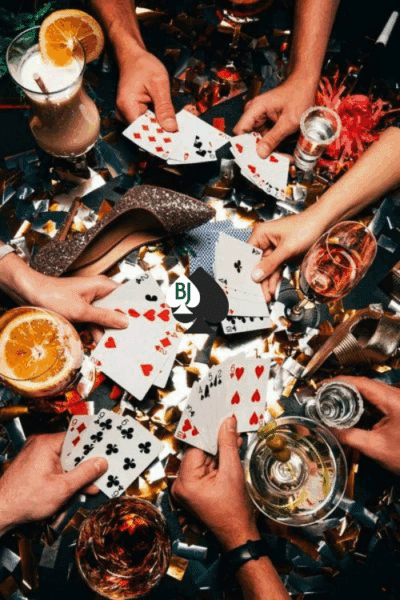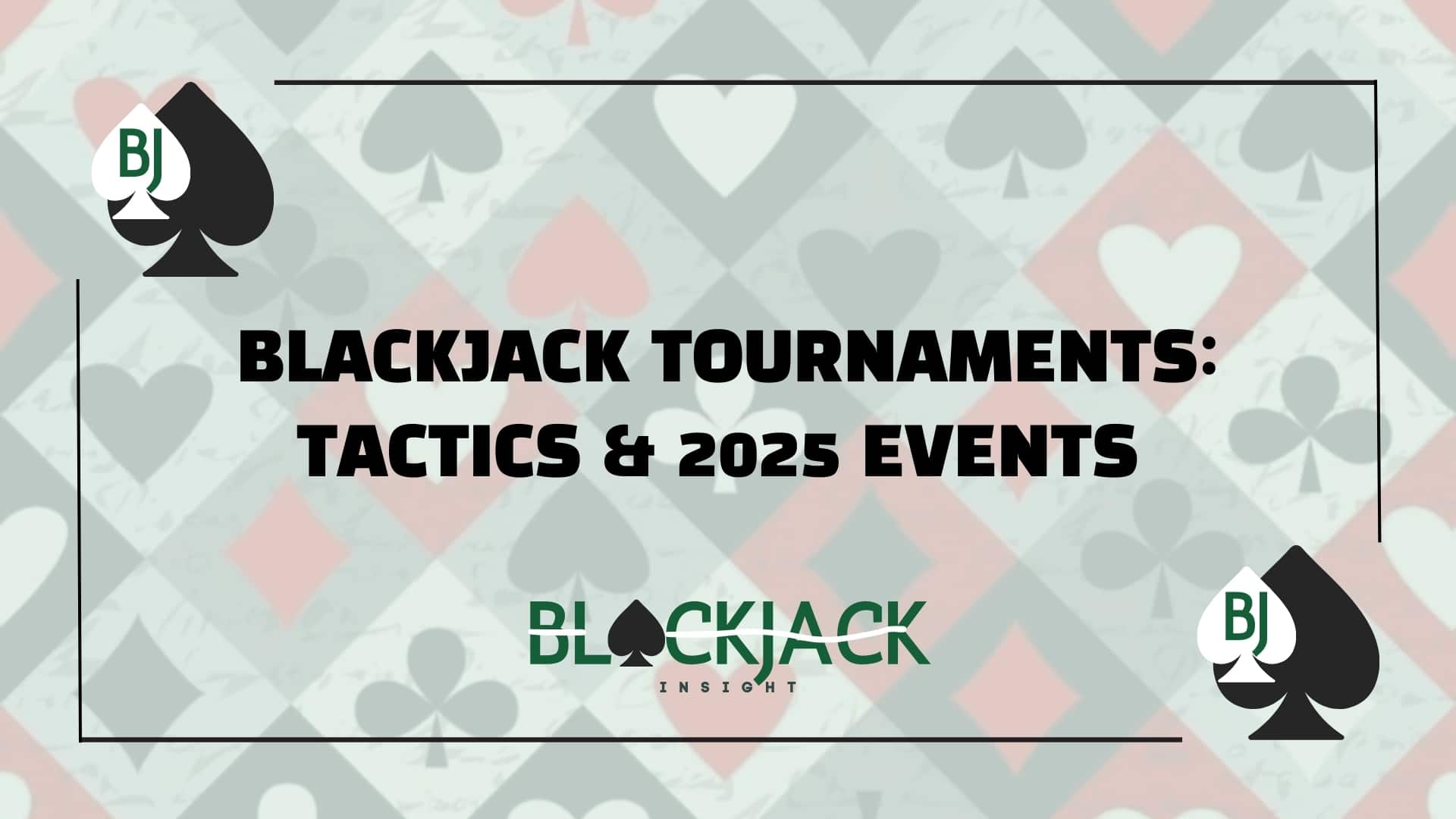Blackjack Tournaments: Tactics & 2025 Events
Table Of Content
Discover how blackjack tournaments turn the game on its head—competing against other players instead of just the dealer. Explore tournament rules, smart strategies, and exciting event highlights.
If you’ve played regular blackjack and thought, “This is fun, but what if I had to beat the people next to me instead of just the dealer?”—welcome to the wild world of the blackjack tournament.
It’s like regular blackjack but with a twist. You’re not just trying to win hands—you’re trying to win more chips than the players at your table. And let me tell you, it’s a whole different beast.
I’ve played dozens of tournaments over the years—from small casino night contests to full-blown blackjack tournaments in Las Vegas—and no two are exactly alike. But the thrill? It never gets old. If you’re new to this format, don’t worry—I’ll break it down so you’re not walking in blind.
What Is a Blackjack Tournament?
At its core, a blackjack tournament is a competitive version of the game where players try to end with more chips than everyone else, not just beat the house.
You’re still playing against the dealer hand by hand, but the real goal is to outperform the people at your table. Think of it like poker—but with cards you already know how to play.
Tournaments can be single-table (just one group) or multi-table events with several rounds, semifinals, and a final table. Sometimes there’s a buy-in, other times the casino covers it as a promo. Either way, there’s usually a decent prize pool waiting at the top.

How Does a Blackjack Tournament Work?
Each player starts with the same amount of tournament chips—usually 1,000 or 1,500—and the same number of hands to play, often 20 to 30 per round. The goal is simple: finish with more chips than your opponents.
Here’s where it gets spicy. In a blackjack tournament, chip count matters more than the actual cards. You might make a risky move not because it’s the best play against the dealer, but because it gives you a chance to leapfrog your rivals.
And no—card counting doesn’t help much here. In most tournaments, the deck is shuffled too often, or rounds are too short for counting to be useful. You’ve got to lean into blackjack tournament strategy instead of just basic blackjack skills.
Blackjack Tournament Rules: Know Before You Sit
Each event may have its own quirks, but most blackjack tournament rules follow a few common themes:
- Everyone starts with the same chip count.
- You play a fixed number of hands.
- Minimum and maximum bets are set.
- Top chip holders at each table advance to the next round.
- In some tournaments, you don’t know other players’ bets until after the hand starts.
- Ties are broken by the highest bet or other pre-set rules.
Always double-check the format before you sit down. The difference between open betting and secret betting can totally change your approach.
Blackjack Tournament Strategy: Playing to Win, Not Just Surviving
This is where things get fun—and different from your usual blackjack game.
In a regular game, you’re focused on the correct play. You’re thinking about odds, house edge, maybe even counting cards. In a tournament? It’s about position, chip stacks, and timing.
Here are a few of my favorite blackjack tournament tips:
- Watch your opponents’ chips. You’re not just playing the dealer; you’re playing them. Know when you need to catch up—and when to protect your lead.
- Bet aggressively when behind. If you’re in last place and there are only a few hands left, small bets won’t save you. You need to make a move.
- Use the last hand wisely. Final hands often decide everything. If you’re leading, bet just enough to hold your position. If you’re behind, go big or go home.
- Don’t overplay early. You can’t win in the first 5 hands—but you can bust out. Stay steady at the start, then adjust as the table evolves.
One time, I was sitting in third place on hand 25 out of 30. The guy in second was playing safe. I went all-in with a suited blackjack side bet—hit it, tripled my stack, and jumped into first. Risky? Sure. But sometimes, that’s what it takes.
How Tournaments Differ?
Some key points differentiate tournaments.
Elimination vs. Accumulative
- Elimination: After certain rounds, the ones with the smallest chip stacks get dropped from the event. This puts extra pressure on each hand since one or two bad plays might show you the exit door.
- Accumulative (Non-Elimination): Competitors gather chips through a series of rounds. In the end, whoever has the largest pile (or is near it) walks away with the top prize.
Sit-and-Go Events
These tournaments kick off right when a table is full. They tend to be quicker and less crowded.
Scheduled Tournaments
They start at a certain time and usually pull in more participants. Because of that, prize pools can shoot up, but so can the competition.
Buy-Ins and Tournament Rewards
Tournament buy-ins run the gamut—from tiny entry fees that anyone can afford to huge amounts meant for high-stakes gamblers. Some events offer a “rebuy” option if you bust early, or you can purchase extra chips at specific times. The biggest prizes go to the top finishers, although smaller prizes often reach multiple players. Sometimes, there are sweet extras like trophies or free entries to a future tournament. I’ve known a buddy who was more proud of his new trophy than the money he won—though he insisted the cash was great, too.
Unique Rules and Twists
Most tournaments raise minimum bets over time, so players have to ramp up their wagers eventually. A few casinos let you split or double only a certain number of times to keep the pace brisk. Some tournaments even use countdown timers to speed along slow deciders. Overlooking these small details might mess up your final outcome—I’ve definitely watched well-seasoned players forget a house rule and make a bad bet at the worst possible moment.
Internet-Based Tournaments vs. Live Action
It’s flexible, and you can play in your pajamas if you like. Different websites allow lower buy-ins, which suits beginners. Many of my students dabble in smaller online contests first because it’s less intimidating than sitting in front of a real dealer with a crowd.
Nothing beats the atmosphere of a physical casino, though the bright lights and chatter from nearby slot machines can throw you off. If you like the thrill of interacting with other contestants face to face, it’s definitely the place to be. In my early days, I got flustered by the background noise, but after a while, I realized half the fun is learning to stay calm no matter what’s going on around you.
Real-Life Tournaments from 2024
Here are the most prominent real life tournaments in 2024.
Las Vegas Invitational Blackjack Championship
- Location: MGM Grand, Las Vegas
- Month: June 2024
- Entry Fee: $1,000
- Prize Pot: $500,000 guaranteed
- 1st Place: $150,000
Comment: Players from across the globe showed up. Word on the floor is that the final table was super tense, and the champion walked off with a custom trophy plus a fancy VIP bundle.
Atlantic City Blackjack Masters
- Location: Borgata, Atlantic City
- Month: August 2024
- Entry Fee: $750
- Prize Pot: $300,000 (approx.)
- 1st Place: $100,000
Comment: They broadcast the finals. Newbies liked this one because the buy-in is moderate compared to the Vegas event.
European Blackjack Open
- Location: Casino Barcelona, Spain
- Month: October 2024
- Entry Fee: €1,500
- Prize Pot: €400,000 guaranteed
- 1st Place: €120,000
Comment: Hosted side contests and mini-seminars. I heard from a student who attended that they loved the entire city vibe—beach by day, Blackjack by night.
Upcoming Highlights in 2025
Don’t miss out these blackjack tournaments in 2025.
World Series of Blackjack
- Venue: Golden Nugget, Las Vegas
- Schedule: March 2025
- Entry Fee: $2,000
- Estimated Pool: $1,000,000
- Likely Top Prize: $300K–$400K
Note: Many big-name pros consider this a must-play event. It might be shown via online broadcasts for those who can’t make it in person.
Macau Grand Blackjack Championship
- Location: Venetian Macao
- Date: July 2025
- Entry Fee: $2,500 (using local currency)
- Projected Pool: $800K–$1.2M
- Possible 1st Place Cut: $250K–$350K
Comment: Known for top-tier high rollers from around Asia. Side games can go on day and night.
Australian Blackjack Crown Cup
- Location: Crown Melbourne
- Month: September 2025
- Entry Fee: AUD 1,500
- Prize Pool: Around AUD 500,000
- Winning Share: Approximately AUD 150,000
Note: An event that draws in international contenders. One friend of mine says the nightlife scene in Melbourne is nearly as fun as the competition itself.
FAQs
1. How long does a blackjack tournament last?
It depends on the format. A single-table tournament might last 30–45 minutes. Multi-round tournaments can go on for hours or span multiple days in big events.
2. How can I enter a blackjack tournament?
You can join a tournament by registering through a casino’s website or an online gaming platform that offers tournaments. Some tournaments may require an entry fee, while others are free to enter.
3. What is the difference between a regular blackjack game and a tournament?
In a regular blackjack game, you play against the dealer with the aim of beating the house. In a tournament, however, you are competing against other players, and your success is measured by your overall chip count or point total relative to your competitors.
4. What strategies work best in blackjack tournaments?
Tournament play often requires adjustments to standard blackjack strategy. Key considerations include managing your chip stack, playing aggressively or conservatively based on your standing relative to other players, and sometimes taking calculated risks to move up in rankings.
5. What types of prizes can be won in blackjack tournaments?
Prizes vary by tournament and can include cash awards, bonus chips, merchandise, or even future tournament entries, depending on the event’s rules and structure.
6. Can beginners join blackjack tournaments?
Yes, absolutely. Many tournaments—especially smaller ones or casino promos—are beginner-friendly. You don’t need to be a pro to join. Just have a basic understanding of blackjack and a willingness to learn on the fly.



